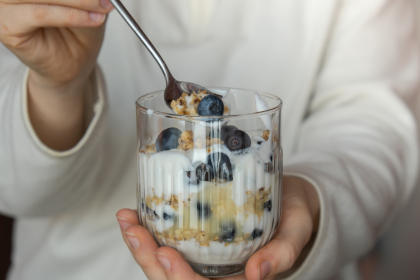Did you know that eating foods high in healthy fats may contribute to weight loss? Fats also promote satiety, nourish your brain, keep your heart strong, and help you absorb essential vitamins and nutrients.
Pre-sorted Prescriptions | Only Pay Your Copays
However, not all fats are created equal. Some promote energy and wellness, while others in excess may negatively impact your health. That’s why it is important to vary the sources of fat in your diet. This article discusses 8 foods that contain healthy fats.
The American Heart Association recommends no more than 7% of your total calories in a day come from saturated fat while the Dietary Guidelines For Americans currently have a more liberal recommendation of 10%. The research has evolved and now advises against completely cutting out saturated fat from your diet. Instead, it recommends focusing on adding more foods rich in unsaturated fats to help meet dietary guidelines. Unsaturated fats include monounsaturated and polyunsaturated fat.
8 Foods High in Healthy Fats
Consider adding these nutrient-rich, fat-containing foods to your diet for a healthier lifestyle:
1. Whole Eggs
Whole eggs are highly nutritious because they deliver high-quality protein, vitamins, minerals, and healthy fats. A large egg contains about 5.45 grams of unsaturated fat, 3.2 grams of saturated fat, and it is also considered a great source of choline, which is essential for proper brain function and development.
The antioxidants lutein and zeaxanthin found in eggs help maintain eye health through their protective effects against age-related macular degeneration. Despite previous concerns about dietary cholesterol, recent scientific research shows that people who are not sensitive to dietary cholesterol can eat moderate amounts of eggs and face no increased heart disease risk.
2. Avocados
Avocados contain healthy monounsaturated fats, including oleic acid, which supports heart health by lowering low-density lipoprotein (LDL) cholesterol levels. A serving of 100 grams yields about 12 grams of unsaturated fat, 2.13 grams of saturated fat, 7 grams of fiber, and essential vitamins like K, E, C, and multiple B vitamins. Avocados have a higher potassium content per 100 grams compared to bananas.
A research study tracking more than 110,000 people for three decades discovered that consuming two or more servings of avocado weekly reduces cardiovascular disease risk by 16 percent and coronary artery disease by 21 percent. Avocados also contain powerful antioxidants such as lutein and zeaxanthin, which help maintain eye health.
3. Fatty Fish
Salmon, mackerel, sardines, tuna, herring, trout, and many other fish stand out because of their substantial omega-3 fatty acid content, which contains both eicosapentaenoic acid (EPA) and docosahexaenoic acid (DHA).
These essential fats are crucial for heart health because they help reduce inflammation, lower triglyceride levels, and decrease the risk of arrhythmias. The American Heart Association suggests eating two 3-ounce fish servings per week to decrease heart disease risk.
Omega-3 fatty acids are also great for the brain. They help maintain function, enhance cognitive performance, and reduce the risk of neurodegenerative diseases. Eating fatty fish regularly also provides anti-inflammatory benefits that enhance overall health. If you eat fish regularly, it’s recommended to choose fish that are lower in mercury.
Medbox: Never Sort Medications Again
4. Nuts
Nuts contain high concentrations of unsaturated fats, proteins, fiber, essential vitamins, and minerals. This makes them ideal components of a balanced diet. Some popular choices include almonds, walnuts, cashews, and pistachios.
Almonds are a great source of monounsaturated fats and vitamin E, which help maintain heart health and support skin integrity. Walnuts provide a rich supply of alpha-linolenic acid (ALA), which is a plant-based omega-3 fatty acid that is essential for brain and heart health.
Magnesium and zinc found in cashews play essential roles in supporting bone health and strengthening the immune system. Pistachios contain high amounts of lutein, which helps older adults maintain their vision. People who consume nuts regularly are less likely to experience heart disease.
5. Seeds
Seeds such as chia, flax, sesame, and pumpkin contain high levels of healthy fats, fiber, protein, vitamins, and minerals. Flax and chia seeds are excellent sources of Omega-3, which supports heart and brain health. Ground flax seeds contain 5 grams of unsaturated fat and 3 grams of fiber in a 2 tablespoon serving. This makes it excellent for digestive health.
Sesame seeds contain high levels of calcium, which helps to strengthen bones. Pumpkin seeds contain magnesium and zinc, which are vital for maintaining good muscle function and strengthening the immune system. People who consume nuts and seeds regularly have lower cholesterol levels and less inflammation.
6. Yogurt

Dairy, in general, is higher in saturated fat than unsaturated fat. However, yogurt and cheese contain essential nutrients and deliver a significant supply of healthy fats, proteins, and minerals. Yogurt comes in different forms, and each type has varying fat content. Greek yogurt made with whole milk, for example, delivers about 0.958 grams of unsaturated fat and 2.39 grams of saturated fat per 100 grams.
Greek yogurt is high in protein, which promotes muscle repair and growth. Yogurt and other dairy products contain probiotics that can help boost digestive health and the immune system.
7. Dark Chocolate
Dark chocolate is an excellent source of healthy fats. A 100-gram serving with 70-85% cocoa content contains about 14 grams of unsaturated fat and 25 grams of saturated fat, which comes from the cocoa butter. It also contains substantial amounts of minerals such as iron, magnesium, and zinc. Dark chocolate supplies the body with flavonoids, which are antioxidants that support heart and brain health by improving blood circulation and lowering blood pressure.
Research reveals that people who eat dark chocolate five times or more each week are 21 percent less likely to develop type 2 diabetes compared to those who eat it less frequently. Dark chocolate tastes great and it can help curb sweet cravings while providing many nutrients.
8. Olive Oil
Extra-virgin olive oil is one of the main ingredients in the Mediterranean diet because of its numerous health benefits. Olive oil contains high levels of monounsaturated fats, especially oleic acid, which supports heart health by lowering LDL cholesterol levels. Research shows that replacing butter with olive oil can reduce the risk of premature death by 17 percent.
Additionally, olive oil contains antioxidants known as polyphenols, which fight oxidative stress and inflammation. The FDA has approved a qualified health claim stating that daily consumption of two tablespoons of olive oil may help lower coronary heart disease risk because of its monounsaturated fat content. Unfortunately, there has been an increase in fraudulent olive oil and mislabeling in recent years. To combat this, the U.S. recently started an olive oil authentication program.
Your Prescriptions Sorted and Delivered
Conclusion
Varying the fats in your diet is essential for overall well-being. The fats found in foods — such as those found in eggs, avocados, fatty fish, nuts, seeds, yogurt, dark chocolate, and olive oil — support heart health, brain function, and nutrient absorption. By making mindful choices and including these nutrient-rich foods in your meals, you can enjoy their many health benefits while maintaining a balanced diet.


